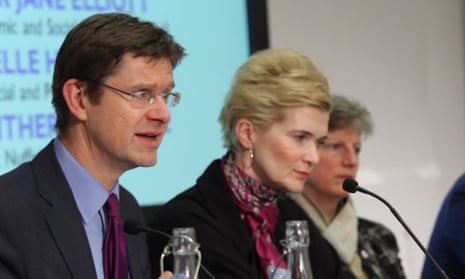Behind graphene, or any other scientific breakthrough, there’s a lab, a city, dense social networks among researchers, commercial connections, finance, and policies for science and innovation. To repeat a basic truth that still gets forgotten, science works in a socio-economic context. It doesn’t advance far if we don’t understand the dynamics of behaviour, attitude and organisation.
Which is why social science has to be embedded in any strategy for science and innovation worth the name. This point was emphasised yesterday by Greg Clark MP, minister for universities, science and cities, in a thoughtful speech to mark the launch of The Business of People, a report on what social science can do for the UK – and vice versa – over the next ten years.
Before entering politics, Greg Clark studied for a PhD in economics, and he spoke last night with genuine enthusiasm about the “thrill of delving into a dataset for the first time, and feeling the sense of discovery, of hypotheses to be tested, and connections to be uncovered.” He mentioned that he’d been grilled recently by the House of Commons science and technology committee on why his ministerial remit extended beyond the natural sciences, and said he’d been happy to set them straight on the crucial place of social science “as part of the family of sciences.”
The government’s chief scientific adviser, Sir Mark Walport, made a similar point in his recent annual report, noting that “Debates about risk are often highly technical while, at the same time, being at least as much about values and choices, about who benefits and who pays.” It’s been encouraging to see Walport, and departmental chief scientists like Ian Boyd at Defra, talking with increasing frequency and conviction about the need for more joined-up work across disciplinary silos to tackle thorny social and environmental problems.
The Business of People has been produced by the Campaign for Social Science, which was set up four years ago to inform policy, build coalitions and get a louder, positive message out about the value of social science. Like our friends in the natural sciences, we are concerned that a continuation of the current freeze in UK research budgets beyond the next election will jeopardize the health and productivity of our research base.
Of course, in times of austerity, money for science of all kinds is tight. In our report, we call for a return to real growth in funding of at least ten per cent over the course of the next Parliament. But importantly, we want these extra funds to be put to work in linking the insights of the physical and life sciences to those of the social science, arts and humanities. How to make these connections more effective is one of the questions that Sir Paul Nurse, president of the Royal Society, is looking at in his review of the UK’s research councils, which is now getting underway.
Our call for more interdisciplinary research chimes with the Economic and Social Research Council’s latest strategy, published last month, and with new initiatives on topics like decision-making across food, energy and the environment. The leaders of other large funders, such as Jeremy Farrar at the Wellcome Trust, are talking in similarly ambitious and holistic terms about the need for collaboration across the natural and social sciences in improving global health. And the journal Nature recently used its new year editorial to declare that “it’s time for the social sciences.”
As well as boosting investment, government needs make sure that it can access the full breadth of available expertise. Just as big technology companies are increasingly employing senior social scientists, so government needs to complement the knowledge and experience of someone like Sir Mark Walport with a heavyweight social scientist, who can assist him in tapping into a deeper understanding of human systems. The current vacancy for a chief scientific adviser at DfID provides an ideal opportunity to appoint someone in such a role.
Whatever the outcome of the May election, the challenges facing the UK will demand the skills, insights and disciplined curiosity of social scientists, working in collaboration with others. It’s with confidence in the necessity of social science that The Business of People stakes its claim on scarce resources.
James Wilsdon (@jameswilsdon) is chair of the Campaign for Social Science and professor of science and democracy at the University of Sussex. David Walker (@Exauditor77) is head of policy for the Academy of Social Sciences and former chair of methods and infrastructure at the Economic & Social Research Council. The Business of People is available free to download here.
